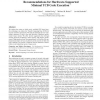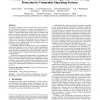121
click to vote
ASPLOS
2008
ACM
15 years 4 months ago
2008
ACM
The constant race for faster and more powerful CPUs is drawing to a close. No longer is it feasible to significantly increase the speed of the CPU without paying a crushing penalt...
126
click to vote
ASPLOS
2008
ACM
15 years 4 months ago
2008
ACM
Multi-core processors, with low communication costs and high availability of execution cores, will increase the use of execution and compilation models that use short threads to e...
113
click to vote
ASPLOS
2008
ACM
15 years 4 months ago
2008
ACM
Integrating more processor cores on-die has become the unanimous trend in the microprocessor industry. Most of the current research thrusts using chip multiprocessors (CMPs) as th...
122
click to vote
ASPLOS
2008
ACM
15 years 4 months ago
2008
ACM
Extracting high-performance from the emerging Chip Multiprocessors (CMPs) requires that the application be divided into multiple threads. Each thread executes on a separate core t...
126
click to vote
ASPLOS
2008
ACM
15 years 4 months ago
2008
ACM
Device drivers commonly execute in the kernel to achieve high performance and easy access to kernel services. However, this comes at the price of decreased reliability and increas...
ASPLOS
2008
ACM
15 years 4 months ago
2008
ACM
Speck1 is a system that accelerates powerful security checks on commodity hardware by executing them in parallel on multiple cores. Speck provides an infrastructure that allows se...
119
click to vote
ASPLOS
2008
ACM
15 years 4 months ago
2008
ACM
We explore the extent to which newly available CPU-based security technology can reduce the Trusted Computing Base (TCB) for security-sensitive applications. We find that although...
103
click to vote
ASPLOS
2008
ACM
15 years 4 months ago
2008
ACM
Increasing demand for power-efficient, high-performance computing requires tuning applications and/or the underlying hardware to improve the mapping between workload heterogeneity...
152
click to vote
ASPLOS
2008
ACM
15 years 4 months ago
2008
ACM
Commodity operating systems entrusted with securing sensitive data are remarkably large and complex, and consequently, frequently prone to compromise. To address this limitation, ...
ASPLOS
2008
ACM
15 years 4 months ago
2008
ACM



